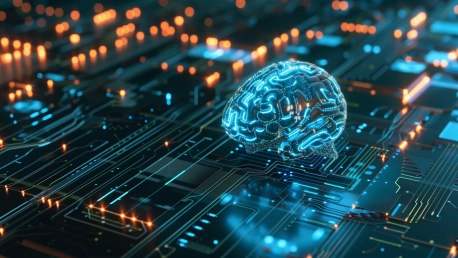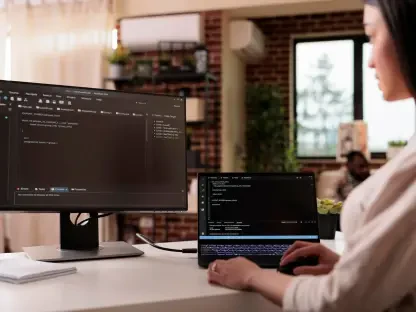In a milieu where rapid innovation is imperative, software development has found a formidable ally in generative artificial intelligence (GAI). This branch of AI is making strides with tools that not only enhance programmers’ efficiency but also amplify their creativity. As we delve into the digital renaissance of coding, we encounter a suite of GAI coding tools that are redefining the parameters of programming. These tools serve to expedite workflows, automate the more monotonous aspects of code creation, and provide sophisticated solutions that would otherwise require a significant investment of time and resources. This burgeoning symbiosis between human ingenuity and artificial intelligence marks a pivot to a future where technology assists in manifesting the full potential of our innovative aspirations.
The Pioneering OpenAI Codex
Making a notable mark is OpenAI Codex, a beacon of progress in the generative AI landscape. With adeptness in interpreting prompts in natural language, Codex propels forward the concept of converting abstract ideas into executable code with remarkable precision. Programmers, from those entrenched in complex debugging challenges to those breaking grounds with prototypes, find in Codex an indispensable partner. This GAI tool excels in its nuanced understanding of various contexts, becoming an engine for innovation that converts conceptual designs into tangible, working code with little more than a description of the programmer’s intent.The crux of Codex’s prowess lies in its underlying GPT models, evolved to decipher intricacies within human language and translate them into the logic of code. This leap in technology holds substantial merit for software development, where the gap between a rough concept and a working algorithm can be vast and densely filled with trial and error. Codex’s ability to generate relevant code snippets across myriad programming languages is a quantum leap towards streamlining the journey from conception to implementation.
GitHub Copilot: A Real-Time Coding Companion
In the realm of collaborative technology stands GitHub Copilot, not as a mere tool but as an AI-powered coding companion, uncomplicating the act of writing software. Born out of the alliance between GitHub and OpenAI, Copilot is elegantly woven into the fabric of the Visual Studio Code editor, offering more than mere suggestions—it’s intuition crystallized. By parsing comments, discerning function names, and unraveling variables, Copilot pre-empts the developer’s needs, sculpting code suggestions that mirror one’s intent.GitHub Copilot shows its mettle as it traverses a vast landscape of languages and frameworks. It introduces a dynamic layer to software development, one that is less about brute-force problem-solving and more about guiding the developer towards a cleaner and more intuitive codebase. Essentially, it’s an AI assistant that spins a coder’s thoughts into code—potentially disrupting how we view the labor and artistry of programming.
DeepCode’s Static Code Analysis
In the heart of GAI’s impressive array, we find DeepCode, which employs AI in scrutinizing codebases to unearth imperfections—from subtle bugs to gaping security vulnerabilities. DeepCode is the embodiment of an intelligent auditor, offering not just criticism but pathways to betterment. Its engine, trained on countless code patterns, wields a sort of prescience, allowing it to foresee and suggest enhancements that fortify both the robustness and the finesse of software.The breadth of DeepCode’s analysis has significant implications for developers, who can now elevate their code’s quality beyond what manual methods allowed. DeepCode’s value proposition is clear: by leaning on the insights provided by an algorithmic analysis, software can be made not only to work but to endure and to excel. Through such tools, GAI extends its influence, ensuring that the programming world moves towards a quality-centric future.
Kite: Streamlined Code Completion
Kite soars as a paradigm of how machine learning can be leveraged to anticipate and fulfill a developer’s coding assistance needs. Integrating across a multitude of programming languages and editors, Kite emerges not simply as a plugin but as a seamless augmentation to the coding environment, offering documentation and code example pop-ups right at the juncture of thought and implementation. It represents a significant advance in how we interact with our programming tools—less interference, more fluency; less distraction, more focus.The real-time delivery of necessary information by Kite means a deviation from the traditional interrupt-driven model of software development. No longer does a coder need to step away from the ideation flow to search for syntax subtleties or function peculiarities. Breaking away from these shackles, Kite gives developers the space to remain engrossed in the creative aspects of code crafting, promoting a more intuitive and uninterrupted development experience.
TabNine: Personalized Code Predictions
TabNine distinguishes itself with an uncanny ability to tailor its auto-completion functionality to the individual style of each programmer. A predictive engine that doesn’t just understand code but adapts to the coder’s own manner of composing it, TabNine’s offering reshapes the concept of efficiency within the coding workflow. TabNine supports a remarkable repertoire of over 50 programming languages, rendering it an essential tool applicable across a broad spectrum of software projects.The individualized nature of TabNine’s predictions has profound implications for how developers build software. The implication is a marked reduction in the cognitive load on coders, who can now depend on intelligent prompts that align with their unique practices and preferences. As a result, productivity isn’t the only beneficiary; the quality of code can be seen to rise as developers focus their energies on structure and complexity, rather than syntax and semantics.
TensorFlow Model Maker: Simplifying ML Workflows
TensorFlow Model Maker stands out for its democratization of machine learning model creation and training. It dispenses with complexities to present straightforward APIs that appeal to both novices and experienced programmers alike, serving as a bridge connecting the two. Model Maker disregards intricate workflow convolutions in favor of an environment where developers can swiftly create and deploy machine learning models tailored to specific tasks without the usual labyrinth of ML development.This shift in machine learning model creation is emblematic of generative AI’s promise to make the intricate simple, the exclusive universal. TensorFlow Model Maker is a testament to a changing landscape where the barrier to entry for employing advanced machine learning in software solutions is not just lowered—it’s transformed into a gateway. This framework of inclusion and empowerment is pivotal for driving innovation and ensuring that the benefits of AI are accessible to a diverse group of developers.
Hugging Face Transformers: Empowering NLP Tasks
Last but not least, the Hugging Face Transformers library garners acclaim for providing a rich collection of pre-trained models, propelling developers to the forefront of natural language processing (NLP). With simplistic APIs and compatibility with prominent frameworks like TensorFlow and PyTorch, Hugging Face Transformers opens the door to complex text analysis tasks that were formerly the domain of deep learning experts. From advanced text generation to sophisticated summarization and sentiment analysis, this library embodies the democratization of cutting-edge NLP technology.By simplifying access to these pre-trained models, Hugging Face Transformers allows developers to focus on applying NLP to solve real-world problems without sinking time into the depths of algorithmic training. It signifies a pivotal move towards a future where complex NLP applications become commonplace, spurred on by the approachability that such AI tools deliver to the broader developer community.The collective insights from these GAI coding tools affirm that the role of AI in programming transcends mere automation; it is about enhancing human capacity. AI is seen not as a competitor to human skill but as a collaborator—adding layers to a developer’s ability to produce high-quality, innovative software. As this technological evolution unfolds, those adept at weaving AI into their development lifecycle are poised to lead the charge into an era of amplified digital creativity and complexity.









